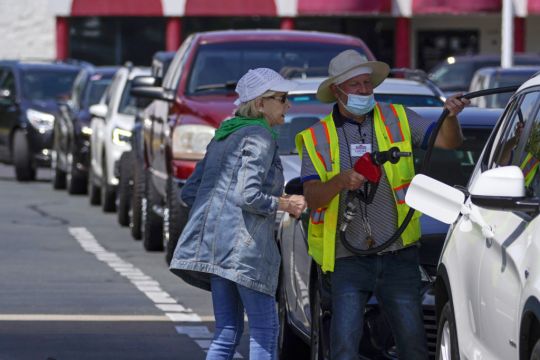The US government has warned the public against hoarding fuel as the shutdown of a major pipeline by hackers entered its fifth day.
Colonial Pipeline, which delivers about 45% of the fuel used on the US East Coast, halted operations last week after revealing a ransomware attack that it said had affected some of its systems.
Government officials acted swiftly to waive safety and environmental rules to speed the delivery of fuel by truck, ship or rail to motorists and airports.
Even so, they sought to assure consumers that there was no cause for alarm.

US Energy Secretary Jennifer Granholm said a large part of the pipeline resumed operations manually late on Monday and Colonial anticipates restarting most of its operations by the end of the week.
Motorists may still feel a crunch because it takes a few days to ramp up operations, but she said there is no reason to hoard fuel.
“We know that we have gasoline; we just have to get it to the right places,” Ms Granholm added.
S&P’s Oil Price Information Service put the number of service stations encountering shortages at more than 1,000.

“A lot of that is because they’re selling three or four times as much gasoline that they normally sell in a given day, because people do panic. It becomes a self-fulfilling prophecy,” said S&P analyst Tom Kloza.
The pipeline runs from the Texas Gulf Coast to the New York metropolitan area, with the states most dependent on it including Alabama, Georgia, Tennessee and the Carolinas, Mr Kloza said.
There were scattered reports of higher fuel prices, but prices were rising even before the pipeline incident ahead of the busy summer driving season.
Nevertheless, Ms Granholm warned service station owners: “We will have no tolerance for price gouging.”

To ease brief shortages, the White House is considering temporarily waiving a law that says ships delivering products between US ports must be built and manned by Americans.
The Transportation Department also is relaxing some workforce requirements and enlisting railroads to deliver fuel inland, while the Environmental Protection Agency has lifted some fuel quality requirements on an emergency basis.
The shutdown was a reminder of the real-world implications of the burgeoning threat of online attacks.
Even as the Biden administration works to confront organised hacking campaigns sponsored by foreign governments, it must contend with difficult-to-prevent attacks from cybercriminals.
“We need to invest to safeguard our critical infrastructure,” President Joe Biden said on Monday.







